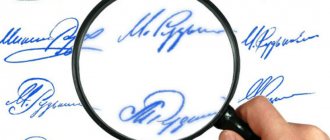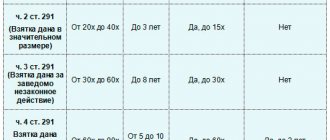Forgery is usually called a criminal offense related to unlawful acts against the federal government. The definition of official forgery, the concept of it, as well as the possibility of correctly identifying this violation in the actions of citizens will be described in this article.
Official forgery - what is it?
About official forgery
The subject of the offense, that is, the SP, is official papers that are used by troops and military formations of Russia, government agencies and municipal institutions, structures of the Russian Armed Forces that assign or remove responsibilities, and also confirm legally important events and incidents. A legal document is a written act that serves as a trigger for certain legal situations to arise.
Federal Law No. 149 of July 27, 2006 contains a definition of an electronic document. This document format is a documented act in electronic form, created for perception using a computer and broadcast through media channels or processing using information channels.
To this we can add an example - a legal decree to terminate or, conversely, initiate criminal proceedings, as evidenced by facts and incidents that have legal significance and can entail legal punishment.
Note ! Therefore, the introduction of false data into the documentation by authorized police representatives, as well as any other law enforcement officers (RF IC, State Drug Control, FSB of Russia, etc.) out of selfish interest, which is determined by the desire to increase the detection rate of criminal cases, is strictly punishable.
Official forgery involves entering deliberately false information into official documents.
In the official documents must contain all the details required by law (date, number, seal and other signs that must correspond to the document itself), and such papers must be registered by authorized employees.
Punishment for forgery of documents
We already know that punishment, according to the same 327th on forgery of documents, can only occur under certain conditions:
- premeditation of the crime;
- using a forged document for its intended purpose;
- receiving personal benefit;
- if the offender is over 16 years of age.
In other situations, the use of such counterfeits will not entail punishment under this article. For example, when, instead of a required document, another document similar in appearance is presented, this will not be a forgery, but an ordinary deception.
How to punish
In order to bring an attacker who forges documents or only uses them to criminal liability, you should contact law enforcement or judicial authorities.
If the identity of the criminal itself is unknown, then law enforcement agencies will have to carry out investigative and search activities. Then, open a criminal case for violating the law.
Kinds
SP can be represented by such actions.
| View | Description |
| Intellectual forgery | It is a crime when false information is entered into an official document, which is obviously inconsistent with real events and facts, thereby violating its authenticity and originality. The same applies to the designation of incorrect details (entering a date that is not linked to the actual day of registration of the document and affixing a fake signature). |
| Material forgery | Correction of official papers, changing its real essence. Such changes may involve partial deletion of data, which may change the meaning of all information contained in the document. Methods of change can include adding to the original text, erasing it, verifying it with a different number, adding inscriptions, etc. |
There are several types of official forgery
Official forgery can occur in a situation where a change in the false nature of information in a document is associated with the work actions of the guilty employee. In other words, forgery is associated with the performance of work functions. In the case when a responsible person in the civil service performs similar actions, but not related to his work duties, then there is no corpus delicti for this crime.
Note ! Official forgery is characterized by direct intent or the presence of a special reason - in the form of self-interest or another motive. A crime under the joint venture is considered committed from the moment false information or distorted facts are entered into a document, which change the essence of its content, regardless of whether this document is subsequently corrected.
When studying this document, you need to take into account that the entry of false testimony into official papers that serve as the basis for issuing citizenship (or a residence permit), the committed act is considered under Article 292 Part 1 of the Criminal Code of the Russian Federation and contains two types of crime.
- Illegal issuance by a responsible person or civil servant of a Russian passport to a citizen of another state or a person who does not have Russian citizenship.
- The entry of false information into documents by a responsible person or civil servant, which allowed an outsider to acquire Russian citizenship under illegal circumstances.
As a rule, official forgery assumes direct intent
These illegal actions, which made it possible to illegally issue citizenship or a passport to strangers, constitute the crime.
Important! In the concept of SP, legislation includes the entry by a civil servant or responsible person of previously known incorrect data (the same as “cleaning of documents”), which changes the real meaning. Such actions must be committed out of self-interest or personal interest.
Article 292 Part 2 also stipulates a more risky type of offense - official forgery, entailing a violation of civil, public and state rights.
Forgery can also be combined with other criminal offenses. For example, to write off embezzlement and so on. At the same time, it is not only necessary to pay great attention to the division of criminal acts, but also to attach importance to qualifying characteristics.
Article 292 of the Criminal Code of the Russian Federation
Object and subject
When understanding the situation, you should separate the concepts of “object” and “subject”.
The object of the crime is state interests, in terms of the performance by government agencies of their functions, and the subject is official acts and resolutions regulating or confirming the results of this activity. The commission of a crime that interferes with the normal functioning of any state or municipal institution is the objective side of the crime.
In this case, not every document can be the subject. The storage medium must meet specific requirements. We are not talking about the material of the carrier, but about its quality side.
The subject matter is considered official acts: legally significant federal or territorial official decrees or documents related to them. Which can be either outgoing or incoming, provided that they have undergone official registration.
Material on the topic Damage to property: Article 168 of the Criminal Code of the Russian Federation
The following requirements apply to documents offered as a subject:
- The act must certify the specific results of events of legal or economic significance. Moreover, it can be of a permissive or prohibitive nature.
- A mandatory feature is the presence of details: date of preparation, stamp of the authority or organization, incoming or outgoing registration number, signature indicating the position, surname and initials of the person who compiled the document, seal.
Article 292 part 1 – comments
Each criminal offense has an object, a subject, as well as their corresponding parties. However, regardless of what article the accused will be charged with, if even one such component is not found in his actions, then he will escape punishment due to the fact that the crime will not be proven.
From an objective point of view, the forgery itself may consist of two actions performed at the same time or in some other way:
- drawing up initially false official papers;
- entering into prepared documents changes that change their essence.
Such documents can be represented by a diploma, work book, regulatory act, sick leave, etc.
If the corpus delicti is incomplete, punishment will most likely not follow.
Thus, the subject of the offense may not be a document that has already existed for some time, but also one that has just been issued, confirming a legal fact and having legal consequences (such as a diploma or work book).
It is important! SP can occur not only with documents coming from a certain organization or person to the official’s workplace, but also with other papers submitted to him for consideration.
The crime is considered completed after the commission of illegal acts with official documents. In this case, the legislation will not take into account whether these documents will be applied somewhere.
Only government employees can bear criminal liability for official forgery. institutions or officials. Ordinary citizens and employees of organizations are not held accountable on this issue.
Only civil servants and officials can be punished for forgery
Such offenses are committed only with selfish intent.
Note ! In another situation, if evidence of an unintentional act is collected, the investigation is able to reclassify such an action as negligence, manifested due to negligence when filling out a document, which has nothing to do with direct intent.
Article 292 part 2 - comments
In Part 2 of Article 292 of the Criminal Code, the legislation highlighted the danger of official forgery for society due to the violation of civil rights (organizations) or public rights (states).
Since the offenses discussed in part 2 of the article have more serious consequences, the punishment for them is more serious.
The offense will be determined when the consequences of the actions of the perpetrators who violated the law become apparent.
Punishments vary depending on the nature of the crime
In this case, it is necessary to establish both causes and effect connections between the actions performed and the resulting consequences. An offense can only have indirect or direct intent.
Note ! Careless actions are out of the question.
Examples of judicial practice
Judicial practice shows that the statistical number of crimes of this type has not changed in recent years and fluctuates at no more than 5 thousand per year.
Cases of independent detection of official forgery are quite rare, but quite often forgery is considered in the totality of acts. Studying data from judicial practice, it can be established that these acts are often committed by healthcare workers to conceal medical errors or negligence.
The leaders among them are late entries into medical records of indications for the provision of necessary assistance. Unfortunately, a typical situation is when, through the fault of a medical worker, due to failure to carry out the necessary procedures, the patient dies.
Later, the doctor, in order to avoid liability, makes notes on the supposed assistance provided in the patient’s chart. If this fact can be established, then the employee is charged with liability in a set of sanctions.
When carrying out investigative measures, any possibility of error in the process of classifying crimes should be excluded. In judicial practice, there was a case when a local government employee was accused of receiving illegal profit from providing an official certificate with distorted information.
During the investigation, it was established that the subject was not the initiator of the action, but only performed the functions of a clerk in accordance with the written instructions of his direct supervisor. The list of the specialist’s job responsibilities included several dozen references to his exercise of control in various areas; in fact, the subject may not have performed the listed actions.
In this case, the employee’s actions were reclassified and fell under Art. 292. This example clearly shows that the law has a preventive function. The effect of Article 292 is largely aimed at combating corruption among employees.
Watch the conversation in the traffic police about forgery in the following video:
Litigation for official forgery
Example No. 1
Alexander, who works as a senior foreman, at the request of his employee Marina, wrote out 4 travel slips for her, and in another, additional one, he made a note that she was on a business trip.
There are quite a few examples of such crimes
Based on the completed documents, Alexander made a report on the shortage before the planned audit. But the verdict of the district court, which ruled on official forgery, was overturned by the cassation court. The court concluded that Alexander was not aware of the actions of the chief accountant and, when handing her documents, believed that she was actually absent, being on a business trip. Based on this, we can conclude that Alexander’s intentions were not to issue false documentation. In this case, there is no criminal violation.
Example No. 2
Valentina served as senior investigator. A case came into her development. But since no evidence of the crime could be found, the investigation was suspended. In order not to receive a reprimand from her superiors for inaction, and also to improve her own performance indicators, Valentina registered the criminal case as solved and entered information about this into the statistical cards of the Ministry of Internal Affairs. Her signature was on the official papers.
The court found Valentina guilty of official forgery. But the cassation commission acquitted Valentina, commenting that despite the investigator’s activities in issuing false cards, her actions could not be called criminal. Those maps in which the information was entered were used only for statistics, and they were used only for departmental work. Therefore, no offenses caused by paper fraud were committed. Cards are not considered an official document.
Often the crime is not discovered, and the perpetrator is acquitted
Example No. 3
Vladimir, holding the position of senior foreman, was involved in the appropriation of state farm property. The court issued a guilty verdict against him, and the joint venture considered the subject of the crime. But the supervisory commission considered the forgery invalid.
According to the law, the collective farm is not related to government agencies, so Vladimir was not an official, which means his actions were recognized as fraud.
Sometimes the crime is reclassified
Nuances of official forgery
In the case where an official committed criminal acts, the purpose of which was to issue false documents, then he exceeded his official powers in order to avoid harmful consequences, the harm from which, however, would be much more significant than what was caused in fact, when it was impossible to do otherwise. Such actions are classified as extreme necessity. Since there is no direct intent here, the person will not be punished in any way.
The commentary to Article 292 of the Criminal Code gives a more expanded definition of “official”, explaining exactly what powers he is vested with. Therefore, if a person draws up any document and enters false information into it, then for this he must have certain job descriptions. But such responsibilities are assigned to officials in the manner required by law, for example, in a job description or employment contract.
Note ! If these requirements are not met, the official issues an unlawful order, for the reason that this sphere of influence is not subject to his control, which means that the issued document will be considered invalid.
Fraud can only be committed by a person who is authorized by law
If an official draws up an official document in order to appropriate property for himself in the future, then in addition to punishment for official forgery, he will also be punished for theft.
If we consider the reasons for committing joint ventures, these may not only be selfish motives. An official has the opportunity to enter false information into papers in order to hide his official inconsistency or wanting to downplay the complexity of the situation.
Very important! Information that does not correspond to reality must be included in genuine official documents. Example: the head of the registry office can put a stamp in the passport by prior agreement, even if there was no divorce itself.
By making changes to documents that change their meaning, we mean correcting the details of the act or, in other words, changing the date of issue.
Official forgery can be material, intellectual
The method of committing official forgery can be material or intellectual. The latter should be understood as making a sample on an official form, but with the entry of false testimony. Thus, the investigation has the opportunity to prove the unreliability of the entered data. Material forgery may be a modification of the content or type of paper.
Note ! In a number of cases, joint ventures in the form of creating false documents are initiated in order to conceal some other offense, including to conceal embezzlement. In such situations, the acts of violators can be classified under two articles at once: 16 and 292 of the Criminal Code of the Russian Federation.
According to statistics from the Ministry of Internal Affairs, the growth of crimes under Article 292 of the Criminal Code continues to increase. Law enforcement agencies are unable to identify new types of forgery of official papers. This all points to the secretive nature of fraud, for example, in the field of electronic technology.
Often, official forgery is hidden fraud
What is document forgery
Forgery is the production of papers in an appropriate manner, but containing false information. It is divided into two types:
- Material means making changes by either erasing, etching, or making a completely fake sample.
- Intellectual - made on a form established by law, but containing data that does not correspond to reality.
FAQ
Can the absence of official papers serve as signs of forgery, for example, if they are lost, confiscated or do not correspond to their serial numbers?
If we talk specifically about your interpretation of the question, then no, it is not. Forgery means investing something in place of what is required, and not the complete absence of an object (document). The absence of official papers may be a consequence of the official’s negligence. However, the information provided is not enough to give a precise answer to the question.
Is it possible to start a criminal trial if there is evidence of official forgery and falsification of information, but the offender is unknown?
To initiate a criminal case, it is necessary to determine the elements of the offense, which includes the subject of the offense (in other words, the culprit). But during the investigation, examinations may be used. Employees who had access to papers in which false information was entered may be identified as suspects.
According to Article 140 Part 2, in order to set the criminal process in motion, it is necessary to have sufficient facts confirming the elements of the crime. In order to initiate an investigation, you do not need to have information about who the offender is. All that is needed is information confirming that a crime has been committed.
Note ! The criminal process is initiated to ensure that a crime has actually been committed, but there must be precise indications of both the offense itself and its criminal nature.
Sometimes the offender may be unknown
If a man was convicted of SP under Article 292 of the Criminal Code, does his own son have the right to ever hold the position of assistant magistrate?
If we follow the saying that children are not responsible for their parents, then the children of convicts can work as anyone. There is no law that relatives are responsible for the actions of their loved ones. Therefore, it is impossible to prohibit them from working in certain jobs or holding special positions.
In 2001, a criminal trial was initiated under the article on official forgery, but it was immediately closed due to an amnesty - literally on the same day. Are there any restrictions on the right to work as a teacher?
If, due to an amnesty, a criminal’s criminal record has been cleared, there can be no restrictions. However, if the criminal record has not been cleared, then the former convict may be allowed to work in his specialty if the commission on juvenile affairs gives the go-ahead. This rule is spelled out in Article 331 of the Labor Code of the Russian Federation.
If a criminal record is cleared, a person can work anywhere
Will it be a forgery using his official position if the judge allowed time to correct the shortcomings of the statement of claim? This application was filed within the period established by law, but the judge made a refusal 5 days later, commenting on the refusal by saying that the plaintiff was unable to file a claim within the period specified by law. However, later the same correction was added to the case by a new judge.
As a lawyer, I see no connection with forgery when using one's official position. The question arises as to whether a covering letter was attached to the revised statement of claim and whether an indication was made that this claim was sent as a response to the decision to leave the statement of claim without consideration? Most likely, the revised claim was accepted as a new one, and the other one was returned due to the fact that the shortcomings were not eliminated.
Note ! In the process of transforming the most important spheres of life in modern society, a large role is assigned to law enforcement agencies, executive and judicial authorities. Therefore, criminal acts within the law enforcement environment and government agencies themselves are especially dangerous and need to be eradicated.
However, professional and organized crime has long attacked government structures and civil service at all levels of government. Many employees and workers have been subject to criminal influence, which interferes with the normal functioning of authorities and management. This undermines the authority of the authorities in the eyes of the public, which is why it often disrupts and slows down large-scale events at all levels. In this regard, malfeasance should not be allowed, and employees who take advantage of their official position should be punished to the fullest extent of the law.
Forgery in other articles of the Criminal Code of the Russian Federation
In total, the Criminal Code of the Russian Federation contains more than 20 offenses that include the attribute “use of forged documents”:
Falsification of evidence in a civil, administrative, criminal case (Article 303 of the Criminal Code of the Russian Federation)
This crime involves the intentional provision of evidence that is obviously invalid (contains distorted data, falsified details, seal, signature, etc.). Criminal liability for such actions may be incurred by both the plaintiff, defendant, and their representatives, as well as officials drawing up protocols, explanations, etc. In practice, cases of criminal prosecution under Art. 303 of the Criminal Code of the Russian Federation is small, but still they exist.
Example No. 3 . Kudryakov V.A. during the consideration of a civil dispute about the division of debts, he provided the district court with a loan agreement concluded during the marriage with Kudryakova S.A., in which it was stated that Kudryakov V.A. borrows 500,000 rubles from a relative for the needs of the family. Kudryakova S.A. in court she stated that she did not know about this loan, that their family has not communicated with that relative for more than 8 years, because they are in a quarrel. At the request of Kudryakova S.A. A handwriting examination was ordered, which established that the loan agreement was concluded not on December 12, 2015, as indicated in the text of the agreement, but on December 18, 2016, that is, on the eve of the court hearing on a family dispute. As a result, the claim for the division of joint debts, filed by V.A. Kudryakov, remained unsatisfied, and the ex-wife, after the decision came into force, turned to law enforcement agencies with a statement to involve V.A. Kudryakov. to liability under Art. 303 of the Criminal Code of the Russian Federation for submitting false documents to the court.
Punishment under this article can reach 4 years in prison.
Forgery or destruction of vehicle identification number (Article 326 of the Criminal Code of the Russian Federation)
Almost always, this crime is charged simultaneously with the theft of a car, because it is no secret that filing or erasing the number of the body, chassis or engine makes it impossible to identify the stolen car, which means it will be impossible to prove the guilt of the attackers in the theft or theft. Forgery of a state registration plate is also punishable under the same article; the maximum penalty can reach three years in prison.
Example No. 4 . Zolotov E.K. together with Mamin A.L. They made a living by stealing cars (we remind the reader that theft of a car differs from its theft in that when it is stolen, the car is almost always sold in parts or entirely to third parties). Zolotov E.K. monitored the surrounding situation, and Mamin A.L. I was well versed in the intricacies of alarm systems, so I was engaged in disabling the protection system. The thieves took possession of A.V. Krasnov’s car, who, after purchasing it, had not yet managed to install the alarm and locked the car with a key, which made the thieves’ task even easier. After the theft, Zolotov E.K. and Mamin A.L. We drove our car into a pre-rented box, where we falsified license plates in order to drive the car to Dagestan. Subsequently, the attackers were convicted under Part 2 of Art. 326 of the Criminal Code of the Russian Federation to 2 years in prison each.
Tax evasion by an individual (Article 198 of the Criminal Code of the Russian Federation)
Already in the very text of this article of the Criminal Code of the Russian Federation, a method is indicated by which a guilty person can evade paying taxes to the state budget - by including knowingly false information in the tax return. Thus, in practice, there are often cases when a citizen indicates additional expenses that he did not actually bear. He does this in order to reduce the tax base - in fact, to underpay to the budget. In part 1 of Art. 198 of the Criminal Code of the Russian Federation provides for liability for tax evasion in the amount of more than 900,000 rubles, in the second part - more than 4,500,000 rubles.
Example No. 5 . IP Ukropin E.O. filed a declaration indicating the actual expenses incurred by him related to the transportation of goods. To justify the expenses, he used obviously forged documents - fictitious contracts on cargo transportation, which in reality did not exist, Ukropin E.O. negotiated with the counterparty, promising him a certain amount as payment for preparing false contracts. As a result, Ukropin did not pay more than one million rubles to the budget; as a result, he was prosecuted under Part 1 of Art. 198 of the Criminal Code of the Russian Federation.
In this example, we see that additional qualifications under other articles of the Criminal Code of the Russian Federation (including Article 327) are not required, since already in Art. 198 of the Criminal Code of the Russian Federation describes actions related to forgery, which is more than enough to be found guilty only under this provision of criminal law.
Loan based on false documents
Until recently, the volume of loans issued to people who, for the most part, would not be able to repay even a small loan, was quite significant. According to some reports, every third loan issued to an individual was issued unreasonably, and with a thorough check by the bank’s security service, approval could not be obtained. Currently, taking into account the huge debts of individuals to banks, the procedure for approving and issuing loans has become less loyal, banks have begun to more often detect forgery of income information,
If we are talking about a loan obtained fraudulently by an individual, a criminal case may be initiated under Art. 159.1 of the Criminal Code of the Russian Federation, for the commission of which the culprit may face up to 10 years in prison (this maximum punishment awaits those who acted as part of an organized group). As for the head of an organization or an individual entrepreneur, if they illegally received a loan, if fictitious information about their financial condition was used, a criminal case is initiated under Art. 176 of the Criminal Code of the Russian Federation, according to which the punishment can reach 5 years in prison.
Example No. 6 . Gorbunov K.E. He applied to the bank for a loan to build a house, and presented a false personal income tax certificate 2 about his monthly earnings of 60,000 rubles. The borrower presented a copy of the work book, which contained a record of work experience since 2002 as a foreman at a brick factory. Having checked this data, the bank's security service was convinced that Gorbunov was indeed working as a foreman at the enterprise indicated by him, but there was no thorough check regarding the level of income, and therefore he received approval for the loan. The borrower successfully received the money from the bank, but refused to pay the loan, as a result of which a criminal case was initiated under Art. 159.1 of the Criminal Code of the Russian Federation. During the investigation, it was established that the 2NDFL certificate was fake and did not correspond to reality - Gorbunov works at the plant as a loader, and to identify the person who forged the certificate (since Gorbunov himself could not do this - he did not have access to the seal), an additional check was carried out.
Example No. 7 . Head of Progress LLC Rodionov P.R. submitted an application to Rosselkhozbank to receive a loan for targeted needs - as they were instructed, for the construction of a farm. The loan was approved, as collateral Rodionov P.R. provided equipment for the production of oil, which is listed on the balance sheet of his organization. After payments stopped coming without explanation from the borrower, during a security check it was discovered that this equipment had been pledged to other banks several times. Due to the fact that the Rodionovs were provided with false information about their financial situation, which was actually on the verge of bankruptcy, law enforcement agencies opened a criminal case under Art. 176 of the Criminal Code of the Russian Federation.
We draw your attention to the fact that according to the general norm of Art. 327 of the Criminal Code of the Russian Federation, it is impossible to bring an individual entrepreneur or the head of an organization to criminal liability, since forgery of documents by such persons incurs administrative liability under Art. 19.23 Code of Administrative Offenses of the Russian Federation, with a fine of up to 40,000 rubles. The exception is those rules that directly provide for liability by the head of legal entities (as in Article 176 of the Criminal Code of the Russian Federation) - under such articles of criminal law, an individual entrepreneur or the director of an enterprise can be found guilty.









